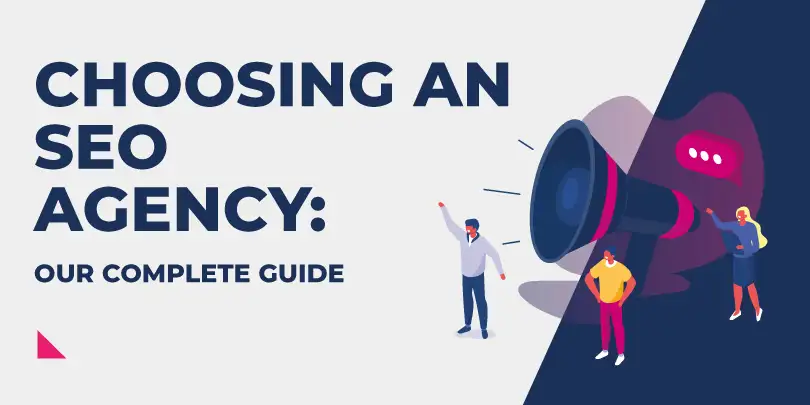
Demand for SEO services is through the roof, as is the number of agencies to choose from. Unfortunately, the results differ drastically from one agency to the next. Many businesses go through multiple SEO providers before finding their perfect match, racking up both costs and trust issues with no increase in revenue to show for it. How do you avoid getting stuck in this cycle? Reboot has put together the ultimate guide to choosing an SEO agency.
Why you need an SEO agency
If you’ve never worked with an agency before or you’re understandably jaded after a bad experience (or three!), you might be wondering: “can’t I just do it myself?”
How do we say this? No, no, a thousand times no.
 Okay, maybe that was a little dramatic. We’re biased, after all. But the point remains: you cannot do search engine optimisation alone, particularly as a rookie, if optimisation is what you truly intend to do. To optimise means “to make the best or most effective use of” (Google’s own preferred definition, by the way). With sufficient time, ability, understanding of how SEO really works and access to agency-standard tools, you might scrape search engine… passability? Search engine just-enough-to-get-indexed or search engine not-actively-accruing penalties, maybe?
Okay, maybe that was a little dramatic. We’re biased, after all. But the point remains: you cannot do search engine optimisation alone, particularly as a rookie, if optimisation is what you truly intend to do. To optimise means “to make the best or most effective use of” (Google’s own preferred definition, by the way). With sufficient time, ability, understanding of how SEO really works and access to agency-standard tools, you might scrape search engine… passability? Search engine just-enough-to-get-indexed or search engine not-actively-accruing penalties, maybe?
Did you know that 90.63% of the more than one billion pages in Ahrefs database get no traffic from Google? Zero. Zilch. Nada. An additional 5.29% of pages get less than ten visits per month. This means that - considering that Ahrefs’ database only includes pages that meet its criteria and therefore doesn’t account for billions of low-quality pages -, only around 4% of all published pages receive any significant traffic from Google. Not only is that likely being quite generous, it also doesn’t tell us anything about the conversion rate of these pages.
There’s a reason your competitors are hiring more SEOs and spending a greater percentage of their digital marketing budgets on them, despite marketing budgets decreasing overall. SEO, as a strategy for driving acquisitions and revenue, is a complex and highly specialised area of digital marketing that can’t be done by one person, especially if that person has a limited SEO background and other responsibilities.
When you D.I.Y your SEO, you’re not actually competing with your competitors - you’re competing with us: agencies. You’re competing with teams of people who are experts in every niche, nook and cranny of digital marketing, led by decades of experience.
The benefit of hiring an SEO agency is that you get the time, energy and expertise of a complete team of specialists in the different areas of SEO - such as content marketing, technical SEO, digital PR and link building - who not only know how to deliver results, but measure them.
Now that we’ve (hopefully) talked you out of attempting to DIY your SEO and competing with agencies who eat, sleep and breathe the algorithm(s), let’s move on to how you pick an agency that doesn’t make you wish you’d read this article earlier.
How to choose an SEO agency
1. FIND OUT ABOUT THE TEAM
SEO is not a one-man band, and any agency you decide to work with should have a toolkit of skills and manpower to get the job done right. A trustworthy agency will comprise not only SEO specialists, but skilled content writers, developers, digital PR agency specialists and graphic designers. These are all the different ingredients required to cook up a killer SEO strategy. Any one missing and you’re either looking at outsourcing or a gap in your agency’s approach.
Essentially, a good firm should possess the following:
- Technical set up
- Team of content writers
- Team of outreach specialists
TECHNICAL SET UP
Technical SEO is its own beast. There are plenty of excellent SEOs who specialise in content or digital PR who have a fairly entry-level understanding of the technical aspects. While all of these areas overlap and work together to create a complete and effective strategy, each area is its own specialism. The right agency will not only have internal resources dedicated to technical SEO, but access to industry-leading tools like Screaming Frog, SEMrush, Ahrefs etc... This not only shows that they are a serious agency who have invested in the right platforms, but it gives them the resources to track their progress and deliver measurable results.
 TEAM OF CONTENT WRITERS
TEAM OF CONTENT WRITERS
In order to attract high-converting traffic to your website, your on-site content needs to target the best long-tail keywords and answer search intent. This means not only ranking highly on SERPs (Search Engine Results Pages), but delivering what the user is looking for and turning site visitors into customers.
Make sure that the content:
- Targets relevant keywords
- Is genuinely useful to a reader and answers the questions they searched for
- Has internal links to other pages/posts on the client’s site
- Has the potential to convert
TEAM OF OUTREACH SPECIALISTS
This is also something you’d want to see offered by your SEO agency. Link earning is achieved by creating great content relevant to your topic, which will be good enough to attract links from industry relevant online publications. Because of the high quality and originality of the content, others will want to link back to it as a reference. A good team specialised in outreach will know exactly who to target in order to get the most out of the content produced and ultimately get as many organic links as possible.
2. SEE HOW THEY BUILD LINKS
Link-building is one of SEO’s most contentious practices - not because its efficacy is debatable, but because some of the methods used to achieve it are. It’s an area rife with bad actors that exploit businesses with lofty promises and cheap, low-quality services that win you nothing but penalties. Ever been DM’d by a link-building “expert” promising to win you 1,000 backlinks in a week? Run.
This particular brand of SEO cowboy cashes in on a common knowledge gap when it comes to your backlink profile: that more links = better. Their approach will likely fill your domain with spammy, low-quality and irrelevant links that directly violate Google’s Webmaster Guidelines, resulting in either a penalty that pushes you further down in the rankings or worse, the indefinite removal of your domain from Google’s index.
While top-ranking websites usually do have a healthy amount of backlinks, the emphasis should always be on quality before quantity, and high-quality links take time, expertise and creativity to build.
Let’s take a look at some types of links:
AUTOMATED LINKS (AVOID)
Hard no. This is probably the method being used by our aforementioned cowboy. These low-quality links are produced using automated tools and they are viewed as spam by Google, which can result in you getting a penalty on your website.
MASS PAID LINKS (AVOID)
Also against Google’s guidelines, this method involves paying a supplier to create these links in batches. This will also eventually trigger a penalty from Google as they are not natural.
FREE SITE LINK FARMS (AVOID)
Another one to avoid, some SEO companies will bulk-create loads of pages with poor content on free sites and link back to your website. Again, this is considered spammy and will put you in Google’s bad books.
LINK BAITING (GOOD SEO)
The hard-won gold standard of link building, link bait is the bread and butter of digital PR. Link baiting is a sign that the link building company has a capable team behind it, as this sort of link building requires writing research that is sent out to a curated database of journalists, who use this research in an article and link back to your site.
3. CHECK IF THEY CONTRIBUTE TO THEIR INDUSTRY
Do you want to know who the best authority on SEOs is? Other SEOs.
SEO - and the wider digital marketing industry - is an intensely tight-knit community. We like each other’s posts on LinkedIn, we interview each other on podcasts, we gossip about page experience and on-demand indexing at conventions… We’re geeks! We love what we do and want to talk about it with other people who love it too.
The best SEO agencies also aren’t precious about our expertise, because we’re always trying new things to keep up with the algorithm, and we love to show off our work.
Do a bit of stalking. Has your potential SEO provider published any recent thought leadership? Are they known for their data-driven SEO experiments? Have they been featured or cited in any industry publications, or interviewed on relevant podcasts? SEO is a rare case where if someone can talk the talk, there’s a very good chance they can walk the walk as well. Plus, you’ll get insight into their personality, their approach and what an experience working with them might look like.
4. UNDERSTAND THE PRICE YOU SHOULD BE PAYING
We understand it can get very confusing when you are looking for a top firm and you see some charge £300/month while others charge £10,000/month. Surely, they all do the same thing, so why not go with the cheaper option? We wish it were as simple as this.
WHY YOU SHOULD AVOID CHEAP SEO AGENCIES
Generally speaking, an untrustworthy firm will charge you peanuts – and you’ll get monkeys. Low-end SEO agencies cannot afford to pay for experienced employees and the professional technical tools they would need to do the job properly. So, you may want to rethink hiring a business with only two or three employees.
The process of optimising your website and getting it to the front page on Google can take some time if done properly and within Google’s guidelines, so entrepreneurs need to be patient. A bad agency will try their best to rush those results, so they can prove to you they are doing a good job for little money.
We’ve said it before, but it bears repeating: a good SEO process relies both on quality and quantity.
A cheap agency will focus solely on quantity, without paying any attention to quality, to the detriment of your business. Why? Because the only way of guaranteeing fast results is to employ black hat tactics, which could get your website removed from Google’s index entirely - and indefinitely.
This is not to say that a company charging £10,000/month is guaranteed to do a great job. We aren’t saying that bad SEO can’t be done at high prices – we are saying, however, that good SEO cannot be done at low prices. The most important thing is always to do your research.
 5. ASK THE RIGHT QUESTIONS
5. ASK THE RIGHT QUESTIONS
Let’s say you’ve done all your research, and you have found a firm that you think could be the one. What are the questions you need to ask your SEO provider to make sure you can trust them with your business? We recommend asking:
- Can you provide me with references (at least five or more) of companies you’ve worked with for at least a year?
- Can you show me examples of links you’ve earned for your clients?
- Can you show me examples of content you have created for your clients?
- Who are your main competitors?
- What is your contribution to the SEO community? Are you active on forums? Are you aware of or have you done any SEO experiments yourself?
- How is your approach different to every other SEO agency?
- How will you help me decide which keywords my site should target? (their answer should focus on various important metrics such as competition, budget, search volume, intent and ROI). Will these keywords help me grow my business?
- What keywords does your agency rank for? (If they can’t rank themselves, how will they rank you?)
- Do you have any experience building and/or migrating websites? (if they do, this suggests perhaps a deeper technical knowledge.)
- Do you outsource any of your services? (the best agencies do everything in-house.)
Simultaneously, you can spot a trustworthy company when they are keen on asking questions and learning more about your company and what you are trying to achieve through them as well, instead of only being on the receiving side. Learn more about what to expect from our blog: ‘Questions any good SEO agencies will ask you”.
6. KNOW THE RED FLAGS
- Now you know what to look for when searching for a great SEO team, but what should you avoid? Here’s a list of red flags you should keep an eye on before deciding on who to hire:
- The company is shy about or avoids giving details on how they gain their links. This most likely means they are doing it against Google’s guidelines and you need to avoid them.
- They want to offer you link-building packages. This is something you want to avoid as a trustworthy company would not be able to guarantee a certain number of monthly links.
- Stay away from one-man bands; SEO is a complex business and cannot be done well by a single person.
- They show you results for keywords with no search volume – of course they will rank for them if there is no competition and nobody else is interested in ranking for them. They would probably be apprehensive about revealing the client, so you wouldn’t even be able to check if they rank or not – definitely avoid.
- They offer technical audits or a report using a free website – they are usually auto-generated and are meant to scare you into thinking your site is in danger just to get you to sign a contract with them.
- They neglect their own website and blog: how are they supposed to look after your site?
- Are they really specialised in SEO, or is it just a Web Design company doing SEO on the side?
7. KNOW THE GREEN FLAGS
Of course, it’s not all about warning signs. If your potential SEO provider ticks the following boxes, you can trust that you’ve got a good’un on your hands:
- They are clear and transparent about their client onboarding and project delivery processes
- They are realistic in their estimations of both time scale and ranking potential
- They are educational in helping you understand SEO and can answer questions about search (although even the best agency in the world will need to audit your site before they can make a concrete, specific judgement about your website)
- They seek to understand your business and your customers in order to create a tailored approach
- They are respected by other SEO professionals
WHAT MAIN POINTS SHOULD I TAKE FROM THIS?
- Do your research before signing on the dotted line: read reviews, check their website, ask the right questions, know what to avoid.
- Quality and quantity are the dream team. Don’t opt for an agency that focuses solely on quantity.
- The more, the merrier! A great agency will be a melting pot of SEO specialists, skilled developers, graphic designers, outreach executives and content writers.
- While expensive doesn’t always mean quality, most times, you get what you pay for.
- Working with a good SEO firm means you need to invest time; however, the payoff will be a profitable business.